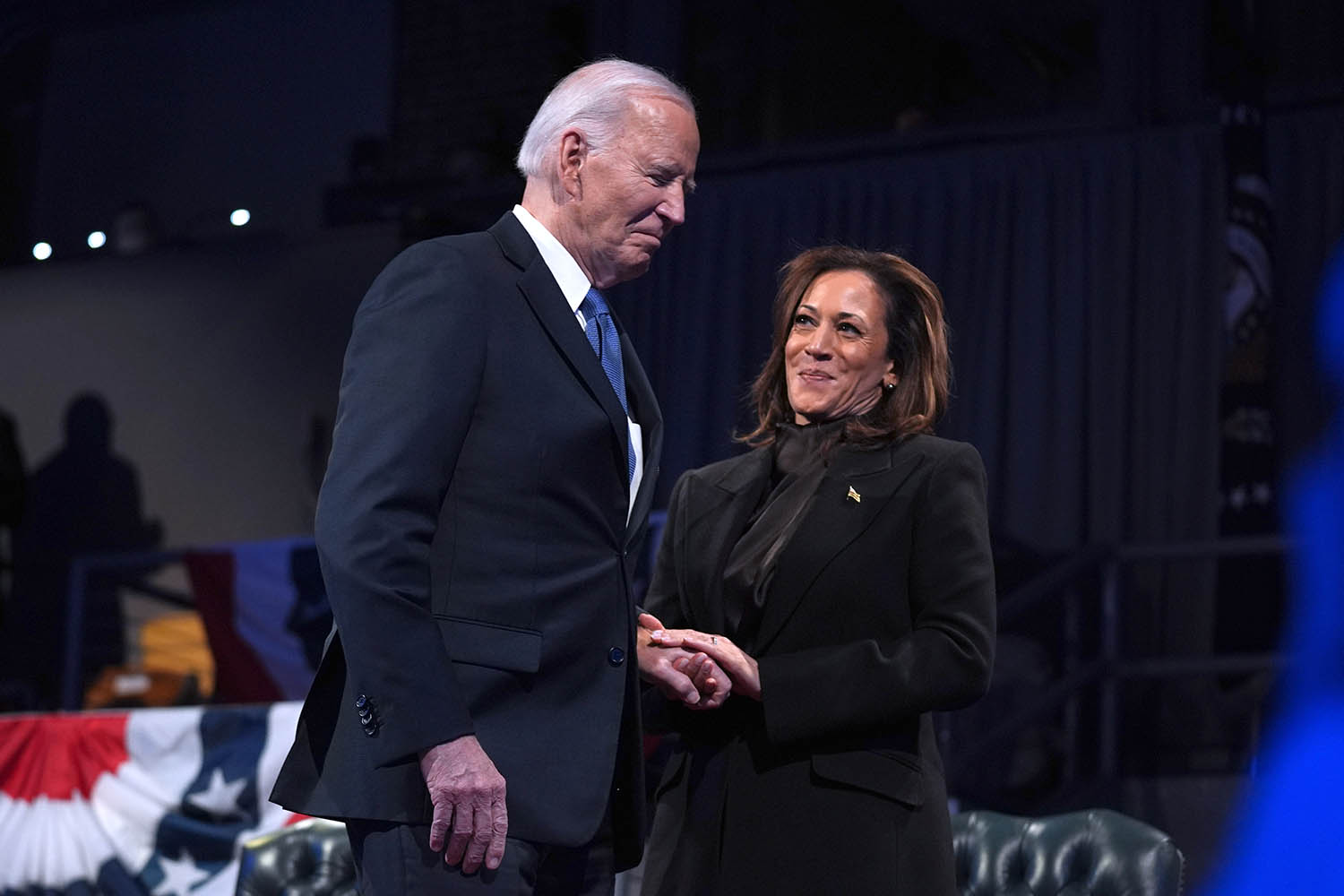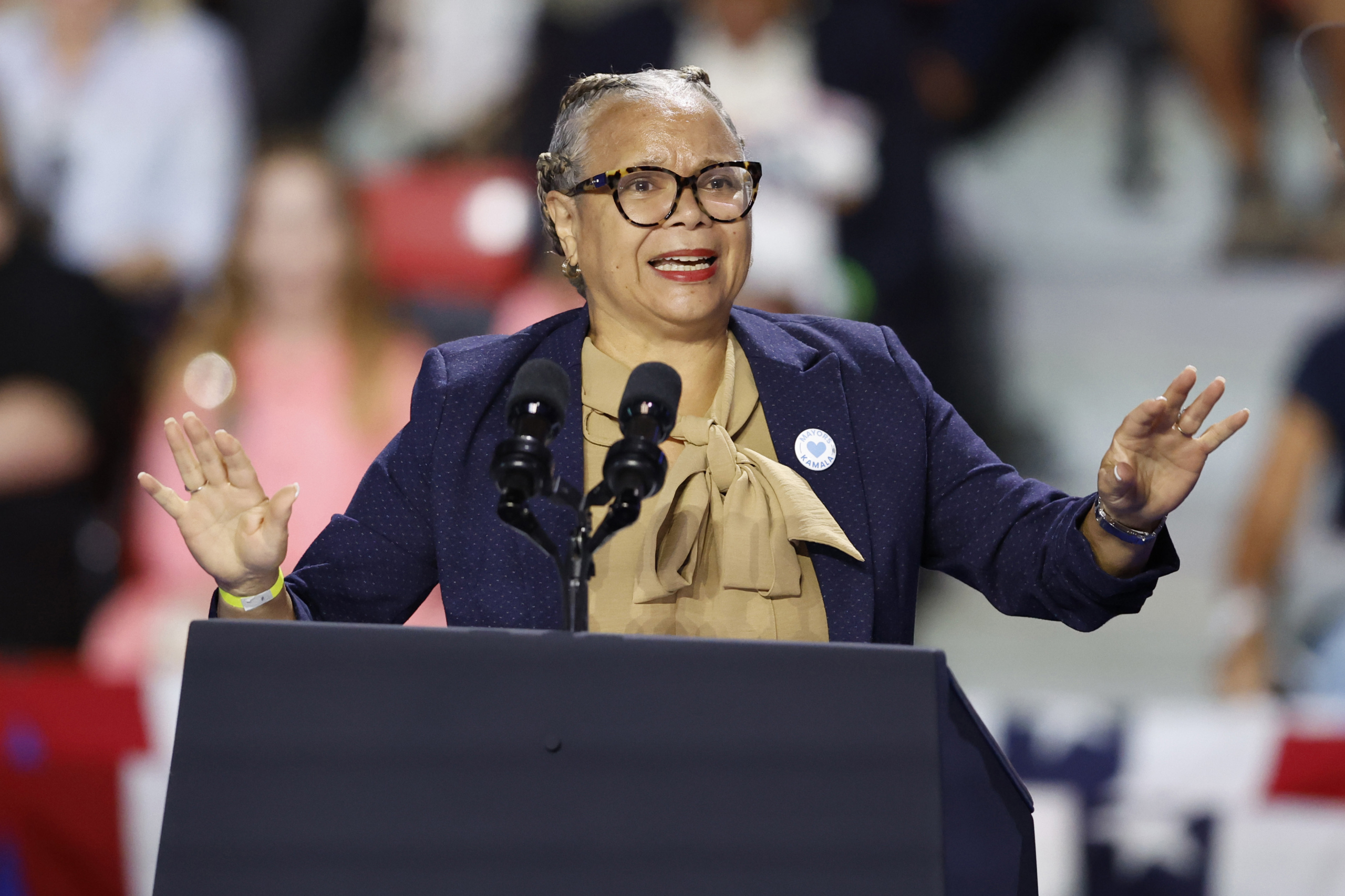Thought of the Day

“Freedom is never voluntarily given by the oppressor; it must be demanded by the oppressed.” – Martin Luther King Jr.


“Freedom is never voluntarily given by the oppressor; it must be demanded by the oppressed.” – Martin Luther King Jr.

By STEVE REED AP Sports Writer
CHARLOTTE, N.C. (AP) — If the Carolina Panthers had any questions about first-round draft pick Tetairoa McMillan’s abilities, they were answered in Week 1.
Coach Dave Canales said McMillan is who he thought he was when the Panthers drafted him No. 8 overall.
The rookie wide receiver didn’t put up a huge stat line on Sunday against the Jacksonville Jaguars, catching six passes for 58 yards, but the Panthers liked the way he handled his assignments and played at full speed — which isn’t always the case with some rookies coming into the league.
“I thought he played fast,” Canales said. “I thought he looked very comfortable out there one-on-one outside. We moved him around a little bit, and he showed an ability to be able to handle that. He and Bryce (Young) were on the same page timing-wise, so I was really pleased with the way he played.”
McMillan said he “didn’t do enough” because Carolina managed just one touchdown in a 26-10 road loss.
His numbers might have raised more eyebrows had it not been for a 16-yard reception down the left sideline that was negated because of offensive holding. He also drew a defensive pass interference, which resulted in a 22-yard net gain for the Panthers.
Neither showed up in his stat sheet, of course.
And then there was the one that could have been.
McMillan had a chance to pull in a one-handed grab in the end zone from Young on a crossing route. Instead, it appeared Jaguars defensive back Tyson Campbell prematurely grabbed one of his arms as the pass arrived, impeding his ability to extend both hands and made the grab in the end zone.
No penalty was called and the ball fell incomplete.
The 6-foot-5, 212-pound McMillan bypassed blaming the officials, saying it was a ball he should have caught despite the contact. He was known for his one-handed grabs while playing for Arizona, where he caught 213 passes for a school-record 3,423 yards in three seasons, along with 26 TD receptions.
“I got to come down with it,” McMillan said. “I feel like that’s a routine catch for me. Next time the opportunity comes, I’m going to make it.”
Said Canales: “I’d love for him to come up with a big touchdown in the end zone, but he ran a beautiful route on it, and he really gave us a chance to have some explosives down the field and to just have a consistent target.”
Still McMillan’s performance was on par with what Canales and his staff saw from him in the preseason, which afforded them the option of trading veteran Adam Thielen.
On Sunday, McMillan returns to his college stomping grounds when the Panthers visit the Cardinals and will look to build on Week 1.
“I feel like the whole week leading up to the game the coaches did a good job of just explaining the coverages, the different coverages they run, and it’s everything that we expected,” McMillan said. “I’m confident in my preparation that I’ve had these these last few months, and you know the DB corps on our team has been pushing me to make sure that I’m ready for anything I get thrown my way.
“So yeah, I feel like that game was a lot easier than I expected.”
NOTES: Panthers starting left tackle Ickey Ekwonu returned to practice after missing Week 1 following an appendectomy.

By HANNAH SCHOENBAUM, ALANNA DURKIN RICHER and MARK SHERMAN Associated Press
OREM, Utah (AP) — Charlie Kirk, a conservative activist and close ally of President Donald Trump, was shot and killed Wednesday at a Utah college event in an act that the state’s governor called a “political assassination.”
A “person of interest” was in custody Wednesday evening, said Utah Gov. Spencer Cox, though no charges were immediately announced.
“This is a dark day for our state,” Cox said, calling the killing a “political assassination.”
“We are actively looking for anyone and everyone who has any information related to the shooting,” he said.
Utah authorities said the shooter wore dark clothing and fired from a roof on campus some distance away.
The death was announced on social media by Trump, who praised the 31-year-old Kirk, the co-founder and CEO of the youth organization Turning Point USA, as “Great, and even Legendary.”
“No one understood or had the Heart of the Youth in the United States of America better than Charlie,” Trump posted on his Truth Social account.
The suspected shooter has not been arrested, Orem, Utah, Mayor David Young said. A person who was taken into custody by law enforcement at the university where Kirk was speaking was not the suspect, according to a person familiar with the investigation who was not authorized to speak publicly.
Videos posted to social media from Utah Valley University show Kirk speaking into a handheld microphone while sitting under a white tent emblazoned with the slogans “The American Comeback” and “Prove Me Wrong.” A single shot rings out and Kirk can be seen reaching up with his right hand as a large volume of blood gushes from the left side of his neck. Stunned spectators are heard gasping and screaming before people start to run away. The AP was able to confirm the videos were taken at Sorensen Center courtyard on the Utah Valley University campus.
Kirk was speaking at a debate hosted by his nonprofit political organization. Immediately before the shooting, Kirk was taking questions for an audience member about mass shootings and gun violence.
“Do you know how many transgender Americans have been mass shooters over the last 10 years?” an audience member asked. Kirk responded, “Too many.”
The questioner followed up: “Do you know how many mass shooters there have been in America over the last 10 years?”
“Counting or not counting gang violence?” Kirk asked.
Then a single shot rang out.
Utah Valley University said the campus was immediately evacuated and remained closed. Classes were canceled until further notice. Those still on campus were asked to stay in place until police officers could safely escort them off campus. Armed officers walked around the neighborhood bordering the campus, knocking on doors and asking for information on the shooter.
Officers have been seen looking at a photo on their phones and showing it to people to see if they recognize a person of interest.
The event, billed as the first stop on Kirk’s “The American Comeback Tour,” had generated a polarizing campus reaction. An online petition calling for university administrators to bar Kirk from appearing received nearly 1,000 signatures. The university issued a statement last week citing First Amendment rights and affirming its “commitment to free speech, intellectual inquiry, and constructive dialogue.”
Last week, Kirk posted on X images of news clips showing his visit to Utah colleges was sparking controversy. He wrote, “What’s going on in Utah?”
The shooting drew swift bipartisan condemnation, with Democratic officials joining Trump, who ordered flags lowered to half-staff and issued a presidential proclamation, and Republican allies of Kirk in decrying the violence.
“The attack on Charlie Kirk is disgusting, vile, and reprehensible,” Democratic California Gov. Gavin Newsom, who last March hosted Kirk on his podcast, posted on X.
“The murder of Charlie Kirk breaks my heart. My deepest sympathies are with his wife, two young children, and friends,” said Gabrielle Giffords, the former Democratic congresswoman who was wounded in a 2011 shooting in her Arizona district.
Though no motive has been disclosed, the circumstances of the shooting fueled concerns that it was part of a spike of political violence that has cut across the political spectrum. The attacks include the assassination of a Minnesota state lawmaker and her husband at their house in June, the firebombing of a Colorado parade to demand Hamas release hostages, and a fire set at the house of Pennsylvania’s governor, who is Jewish, in April. The most notorious of these events is the shooting of Trump during a campaign rally last year.
Former Utah congressman Jason Chaffetz, a Republican who was at the event, said in an interview on Fox News Channel that he heard one shot and saw Kirk go back.
“It seemed like it was a close shot,” Chaffetz said, who seemed shaken as he spoke.
He said there was a light police presence at the event and Kirk had some security but not enough.
“Utah is one of the safest places on the planet,” he said. “And so we just don’t have these types of things.”
Turning Point was founded in suburban Chicago in 2012 by Kirk, then 18, and William Montgomery, a tea party activist, to proselytize on college campuses for low taxes and limited government. It was not an immediate success.
But Kirk’s zeal for confronting liberals in academia eventually won over an influential set of conservative financiers.
Despite early misgivings, Turning Point enthusiastically backed Trump after he clinched the GOP nomination in 2016. Kirk served as a personal aide to Donald Trump Jr., the president’s eldest son, during the general election campaign.
Soon, Kirk was a regular presence on cable TV, where he leaned into the culture wars and heaped praise on the then-president. Trump and his son were equally effusive and often spoke at Turning Point conferences.
__
Richer and Sherman reported from Washington. Associated Press writers Nicholas Riccardi in Denver and Michael Biesecker, Brian Slodysko, Lindsay Whitehurst, Michelle L. Price and Eric Tucker in Washington contributed to this report.

Only The New Pulse FM is giving away a flight for 2, 1 hotel room, and 2 tickets for Chappell Roan in Kansas City on Friday, October 3rd. Listen for the Chappell keyword anytime we play her weekdays from 5 a.m. -7 p.m.! The more keywords you enter below, the better your chances of winning!
The New Pulse FM’s Flyaway Trip to See Chappell Roan in Kansas City is brought to you by Once Upon A Child Raleigh, where they invite you to make them your go-to destination for stylish and affordable kids’ clothes! Once Upon a Child buys and sells gently-used clothing, shoes, toys, and more for babies to teens, making budget-friendly shopping a breeze! Why pay full price? Get SAME DAY cash for your items and find fabulous deals in-store! Visit Once Upon a Child Raleigh today at 6411 Triangle Plantation Drive, Raleigh, and at 340 N/ Spence Avenue, Goldsboro.


By CLAUDIA LAUER Associated Press
After Decarlos Brown Jr. was arrested for the fatal stabbing of a Ukrainian refugee aboard a North Carolina commuter train, he was quickly sent to a state mental hospital for an evaluation. It was a sharp contrast from a January misdemeanor arrest, where it took more than six months for a court to order a mental evaluation after Brown told officers that he had been given a human-made substance that controlled when he ate, talked or walked.
The Justice Department on Tuesday charged Brown, 34, with causing death on a mass transportation system last month when he allegedly killed 23-year-old Iryna Zarutska in what has become the latest flashpoint for the White House’s efforts to paint Democratic-led cities as havens for violent criminals.
The January arrest was just one of the missed opportunities in Brown’s criminal history, according to experts. He had cycled through the criminal justice system for more than a decade, court records show.
“I think there are multiple failed opportunities here, in the mental health space and in the criminal justice space,” said Kenneth Corey, a former department chief for the New York City Police Department who now teaches at the University of Chicago Crime Lab’s Policing Leadership Academy.
Court records show Brown was initially charged in 2014 with being a felon in possession of a firearm, which is sometimes used by federal prosecutors to pull cases into the federal system where there are often stiffer penalties. Federal prosecutors did not take the case, and the state charge was dropped in exchange for a guilty plea on a charge of robbery using a deadly weapon, court records show.
The Justice Department filing Tuesday was Brown’s first charge in federal court, according to a search of federal records.
Brown also is now charged with first-degree murder in state court, where records show he was sent a week after his arrest to a state mental hospital for an evaluation to determine his capacity to proceed with trial. Both the federal charge and the state charge could carry the death penalty.
Calls to the Mecklenburg County Public Defender’s Office were not answered Wednesday.
Video released Friday shows Zarutska entering a light-rail train on Aug. 22 and taking a seat in front of Brown. Minutes later, without any apparent interaction, he pulls out a pocketknife, stands and slashes her in the neck, investigators said.
The Trump administration has blamed Democrats for what they say is out-of-control crime and violence in blue cities. The White House has highlighted Brown’s case and Trump has repeatedly referred to it, saying in one social media post: “Criminals like this need to be LOCKED UP.”
U.S. Transportation Secretary Sean Duffy chimed in early Wednesday announcing the Federal Transit Administration had launched an investigation into the security spending and safety plans for the Charlotte Area Transit System. Charlotte Mayor Vi Lyles said in a statement that the city would cooperate and has already committed to increasing security and police patrols on the system.
Corey said many federal prosecutors offices tell police and local officials they lack financial resources to try more cases of felons in possession of a firearm, which carries a penalty of up to 10 years in prison. But he believes the charge could be used better as a tool against the small percentage of people responsible for repeated violent offenses.
“They end up taking only the worst of the worst because they don’t have the resources,” Corey said. “And to be clear, despite multiple previous arrests, I’m not sure this man’s case rose to anywhere near that threshold.”
In January, Brown was arrested after repeatedly calling 911 from a hospital, where he complained that someone was trying to control him with foreign substances. He was quickly released without bail on a promise to return for court, which is standard for lower-level misdemeanors. The charge carries a maximum sentence of four months in jail under standards approved by the Republican-led Legislature in 2013.
His public defender requested a mental evaluation to determine if he could contribute to his defense. A judge signed an order on July 28 telling Brown to report to a community forensic evaluator within seven days. It’s unclear if Brown went. Court records show that after the train stabbing, the evaluation order was canceled without being finished.
Dr. Robert Cochrane, the statewide director of forensic services at North Carolina’s Department of Health and Human Services, noted symptoms of mental illness can ebb and wane and that anyone can petition the court if they think someone can’t contribute to their own defense.
“But it requires a court order to do an evaluation,” he said.
Delays for court-ordered evaluations aren’t long in North Carolina.
In the first six months of this year, department records showed it took on average 18 days for court-ordered evaluations by a certified forensic evaluator in the community — the standard for lesser charges. It took 69 days on average between an order and an evaluation at a state mental hospital where people facing higher-level crimes are more often sent, and which usually involve more in-depth investigations including seeking records and interviews with family or friends.
Brown’s mother told local television she sought an involuntary psychiatric commitment this year after he became violent at home. Doctors diagnosed him with schizophrenia.
But experts say involuntary commitments are often difficult to obtain. A court must find someone to be a danger to themself or others. Once someone is stabilized, they generally are free to leave.

By MICHELLE L. PRICE Associated Press
WASHINGTON (AP) — Former Vice President Kamala Harris says it was “recklessness” for Democrats to leave it to President Joe Biden to decide whether to continue seeking another term last year, but she defends his ability to do the job, according an excerpt of her new book.
Harris, in an excerpt of “107 Days” published Wednesday in The Atlantic, writes that as questions swirled about whether the then-81-year-old Biden should seek reelection, she and others left the decision to him and first lady Jill Biden.
“Was it grace, or was it recklessness? In retrospect, I think it was recklessness,” Harris said.
The remarks are the first time Harris has been publicly critical of Biden’s decision to run again — an ill-fated decision that saw him drop out in July 2024 after a disastrous debate performance, leaving her to head up the Democratic ticket and ultimately lose to Republican Donald Trump.
“The stakes were simply too high,” Harris writes in the book. “This wasn’t a choice that should have been left to an individual’s ego, an individual’s ambition. It should have been more than a personal decision.”
Biden’s office did not immediately have a comment Wednesday.
Throughout the campaign and in its wake, Harris had avoided much criticism of the president she served beside and defended him amid questions about his mental acuity.
In the book excerpt, Harris continues to defend Biden’s ability to do the job but describes him in 2024 and especially at the time of his “debate debacle” as “tired.”
“On his worst day, he was more deeply knowledgeable, more capable of exercising judgment, and far more compassionate than Donald Trump on his best. But at 81, Joe got tired. That’s when his age showed in physical and verbal stumbles,” Harris writes. “I don’t think it’s any surprise that the debate debacle happened right after two back-to-back trips to Europe and a flight to the West Coast for a Hollywood fundraiser. I don’t believe it was incapacity.”
She adds that if she believed Biden were incapacitated, she would have said so out of loyalty to the country.
Harris also blames those close to Biden for unflattering media coverage throughout the time she served as vice president and throwing her under the bus to boost Biden’s public standing.
She writes about receiving a high level of scrutiny as the first female vice president but says “when the stories were unfair or inaccurate, the president’s inner circle seemed fine with it. Indeed, it seemed as if they decided I should be knocked down a little bit more.”
Harris writes that she often learned that Biden’s staff was “adding fuel to negative narratives” that surrounded her, such as stories about her vice presidential office being in disarray and having high turnover.
The former vice president also accuses Biden’s staff of being afraid of her upstaging him, describing a speech she gave in Selma, Alabama, in March of last year in which she called for an immediate ceasefire in Gaza and more humanitarian aid to be delivered to people there.
“It went viral, and the West Wing was displeased,” Harris says, “I was castigated for, apparently, delivering it too well.”
She suggests that diminishing her also diminished Biden, especially “given the concerns about his age.”
Harris’ success, she writes, would be a marker of Biden’s good judgment and a reassurance to the public that if something happened to the president she could step in.
“My success was important for him,” she writes. “His team didn’t get it.”
Harris’ book, whose title is a nod to the length of her abbreviated presidential campaign, is set to be published by Simon & Schuster on Sept. 23.

This recipe is the perfect homemade appetizer for when the weather starts to get a little cooler. Enjoy it with your favorite chips, crackers or bread.
1. Preheat the oven
Preheat the oven to 400 degrees f.
2.Build the base
In a medium-sized bowl, combine the cream cheese, sour cream and mayonnaise. Drain and chop the artichoke hearts and pat the spinach with a paper towel to soak up most of the moisture.
3. Add the good stuff
Add the spinach, artichokes, garlic, parmesan cheese, spices and 1 cup of the mozzarella to the bowl and stir to combine.
4. Prep for the oven
Spray a baking dish with oil (9×9 or a cast iron skillet work great) then pour in the dip. Sprinkle the remaining cup of mozzarella on top.
5. Bake
Bake in the preheated oven for about 20 minutes, or until the cheese starts to bubble on top.
5. Serve it hot
Serve immediately with your favorite chips, crackers or bread and enjoy the goodness!


Life is a mystery to be lived, not a problem to be solved.

By ADRIANA GOMEZ LICON and GARY D. ROBERTSON Associated Press
RALEIGH, N.C. (AP) — A Democratic mayor secured a comfortable win in a primary election despite days of intense backlash following the deadly stabbing of a young Ukrainian woman on a commuter train in Charlotte, North Carolina.
Mayor Vi Lyles is seeking a fifth term but is coming under criticism after images of the attack sparked widespread outrage from President Donald Trump to other Republicans and figures in the “Make America Great Again” movement. They say the killing of 23-year-old Iryna Zarutska shows how Democrats are too soft on people with criminal records. Democrats who challenged her in the primary also said the mayor’s response has been insufficient.
The killing is fueling Trump’s tough-on-crime campaign as he seeks to take over law enforcement agencies in Democratic-led cities. It’s also given Trump and his allies a way to make an appeal to the American public as they indict measures spurred by Democrats to fight bias in police and courts, despite violent crime having decreased nationwide.
Trump has not specifically criticized the mayor, but said the victim’s “blood is on the hands of the Democrats who refuse to put bad people in jail.”
Despite the attack and its fallout, Lyles was still seen as the front-runner for reelection.
Four lesser-known Democratic candidates challenged Lyles in the primaries. One of them, Brendan Maginnis, mentioned the stabbing prominently in his Aug. 29 public safety plan, saying he would prevent similar tragedies on Charlotte’s light rail. Tigress Sydney Acute McDaniel said Lyles was a “day late and a dollar short.”
Lyles will take on Republican Terrie Donovan, a real estate agent who faced no primary opposition in the heavily Democratic city, in the November general election. She had already made crime her top issue even before the killing. Donovan released a statement on the case.
“This tragedy must serve as a wake up call for all of us to demand better from our elected officials,” Donovan said in a statement.
Charlotte’s politics shifted to the left over the past generation as North Carolina’s population surged, particularly in urban areas where affluent, out-of-state transplants taking high-tech jobs weren’t necessarily attracted to Republicans’ conservative agenda on social issues.
In the city, 42% of the voters are registered as Democrats, 17% are registered as Republicans. Almost 40% are unaffiliated, but are able to vote in Democratic or Republican primaries.
Lyles became mayor in 2017 after unseating incumbent Jennifer Roberts, a Democrat whose one two-year term was marked by battles such as the city’s handling of violence that erupted after a man’s shooting death by a police officer.
Lyles has never been seriously challenged since winning her first term, when she defeated her Republican rival with 59% of the vote. She won reelection in 2023 with 74% of the general election vote.
Lyles posted an open letter on social media late Monday, calling Zarutska’s death a “tragic failure by the courts and magistrates.”
“Our police officers arrest people only to have them quickly released, which undermines our ability to protect our community and ensure safety,” Lyles added.
“We need a bipartisan solution to address repeat offenders who do not face consequences for their actions and those who cannot get treatment for their mental illness and are allowed to be on the streets.”
___
Gomez Licon reported from Fort Lauderdale, Florida.

By DAVE COLLINS Associated Press
Conspiracy theorist Alex Jones has asked the U.S. Supreme Court to hear his appeal of the $1.4 billion judgment a Connecticut jury and judge issued against him for calling the 2012 Sandy Hook Elementary School shooting a hoax staged by crisis actors.
The Infowars host is arguing that the judge was wrong to find him liable for defamation and infliction of emotional distress without holding a trial on the merits of allegations lodged by relatives of victims of the shooting, which killed 20 first graders and six educators in Newtown, Connecticut.
Judge Barbara Bellis, frustrated at what she called Jones’ repeated failure to abide by court rulings and to turn over certain evidence to the Sandy Hook families, issued a rare default ruling against Jones and his company in late 2021 as a penalty. That meant that she found him liable without a trial on the facts and convened a jury to only determine what damages he owed.
A six-person jury in Waterbury issued a $964 million verdict in October 2022 in favor of the plaintiffs — an FBI agent who responded to the shooting and relatives of eight children and adults who were killed. Bellis later tacked on another $473 million in punitive damages against Jones and Free Speech Systems, Infowars’ parent company that is based in Austin, Texas.
During the trial to determine damages, relatives of the shooting victims testified that people whom they called followers of Jones subjected them to death and rape threats, in-person harassment and abusive comments on social media. Jones argues there was never any proof presented that linked him to those actions.
Jones filed his request to the Supreme Court on Friday and it was released by the court on Tuesday.
Jones’ lawyers — Ben Broocks, Shelby Jordan and Alan Daughtry — insist in the petition that state courts cannot determine liability based only on sanctions such as default rulings. They say that constitutional law and Supreme Court precedent require public figures such as the Sandy Hook families to prove their defamation claims against journalists such as Jones.
They also say that the Connecticut judge imposed the default ruling on Jones based on “trivial” reasons and that Jones had substantially complied with the court’s orders — which the Sandy Hook families’ lawyers deny.
Jones’ attorneys further cite First Amendment protections for free speech, saying Jones’ comments about the school shooting being a hoax were not defamatory but rather “expressions of constitutionally protected opinion.” Jones has since said he believed the shooting was “100% real.”
“The media landscape is rife with groups challenging various events, including Holocaust denial, moon landing skepticism, 9/11 conspiracy theories, and even flat Earth claims,” the petition says. “However, such statements critique or dismiss the events themselves, not the character, conduct, or reputation of those associated with them.”
Among other claims, Jones’ petition says the $1.4 billion judgment is excessive punishment under the Eighth Amendment.
If the judgment is allowed to stand, Jones’ lawyers said it would “chill the reporting of news” and “result in self-censoring fear of suits.”
Lawyers for the Sandy Hook families disputed Jones’ arguments.
“There is no legitimate basis for the U.S. Supreme Court to accept this last gasp from Alex Jones and we will oppose it in due course,” Christopher Mattei, a lawyer for the families, said in a statement.
A mid-level appellate court in Connecticut upheld all but $150 million of the $1.4 billion judgment in December, and the state Supreme Court declined to hear Jones’ appeal of that ruling in April.
In a similar defamation lawsuit filed in Texas by the parents of another Sandy Hook victim, Jones was found liable without a trial as punishment for failing to turn over documents. In that case, which also is being appealed, a judge and jury issued a $49 million judgment against Jones in August 2022.
Jones filed for bankruptcy in late 2022. In those proceedings, an auction was held in November to liquidate Infowars’ assets to help pay the defamation judgments, and the satirical news outlet The Onion was named the winning bidder. But the bankruptcy judge threw out the auction results, citing problems with the process and The Onion’s bid.
The attempt to sell off Infowars’ assets has moved to a Texas state court in Austin. Jones is now appealing a recent order from the court that appointed a receiver to liquidate the assets. Some of Jones’ personal property is also being sold off as part of the bankruptcy case.